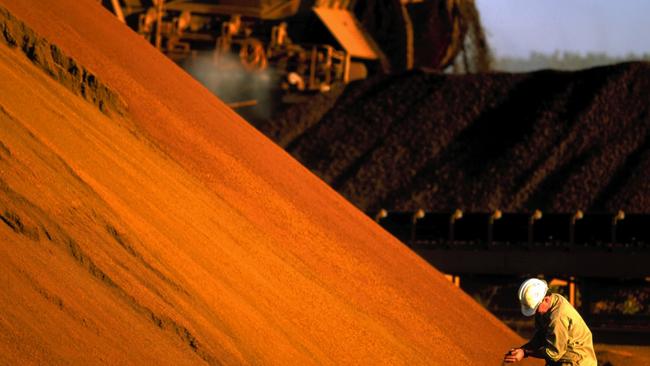Rio Tinto accused over dumping of artefacts
The mining giant is accused of allowing hundreds of cultural artefacts in the Karijini gorges, dating back 18,000 years, to be dumped at a tip.

Traditional owners of the Karijini gorges where Rio Tinto owns the Marandoo mine accuse the company of allowing hundreds of cultural artefacts dating back 18,000 years to be dumped at a tip.
A large amount of material excavated in the early 1990s was sent for analysis but ended up being taken to a tip by accident, according to the Wintawari Guruma Corporation in a submission to a parliamentary inquiry into the destruction of Juukan caves.
“(The company) outsourced that salvage work, and collections and excavations were undertaken at 28 sites in a short space of time,” the submission states. “Most of the excavated cultural material was taken out of Eastern Guruma country to an interstate university for analysis.
“By 1997, the bulk of the excavated and cultural material had been taken to the tip in Darwin and thrown away, along with notes, papers and records relating to what had been salvaged.”
The corporation says the action breached a key condition that Rio Tinto was required to meet in return for the then Lawrence Labor government passing the 1992 Marandoo Act, a one-off piece of legislation that effectively excused Rio and its wholly-owned subsidiary Hamersley Iron from having to comply with Aboriginal heritage laws in that area.
It required the owners of Marandoo mine to salvage, analyse and manage cultural material from numerous heritage sites that would be destroyed at Marandoo.
“It is (our) view that the accidental, and then deliberate, discarding and destruction of Eastern Guruma cultural material was never disclosed to the Eastern Guruma people,” the submission states. “It is a secret that has been kept by (the company) and government for some 25 years.”
The excision of Marandoo from the state’s Aboriginal heritage laws is widely regarded as a mistake and the McGowan government promised in 2020 to repeal the act that allowed it. It is also overhauling the state’s Aboriginal and cultural heritage laws with the aim of putting traditional owners at the centre of agreement making, rather than an interested party. The Wintawari Guruma Corporation was making its second submission to the parliamentary inquiry examining events that led Rio to blast the ancient Juukan caves against the wishes of traditional owners in March 2020.
Rio Tinto iron ore chief executive Simon Trott released a statement on Friday saying the company supported the state government’s decision to subject Marandoo to Aboriginal cultural and heritage laws.
“We’re not proud of many parts of our history at Marandoo and we reiterate our apology to the traditional owners of the land, the Eastern Guruma people, for our past actions,” he said. “We know we have a lot of work ahead to right some of these historical wrongs.
“This will take time, consistent effort and open dialogue with the WGAC to rebuild trust and reset our relationship for the future. Our leadership team are engaging regularly on this important work and are committed to meeting with the WGAC again when they are ready.
“We have committed to all traditional owners on whose land we operate in the Pilbara that we will modernise our agreements with them. This includes changing the way we work together, putting in place measures to ensure greater awareness, respect and preservation of cultural heritage, and improving the economic and social outcomes that come from mining.”
The Marandoo splits the Karijini National Park in the Hamersley Ranges, 35km northeast of Tom Price in the central Pilbara. The mine opened in 1994 and is expected to operate until at least 2030.



To join the conversation, please log in. Don't have an account? Register
Join the conversation, you are commenting as Logout